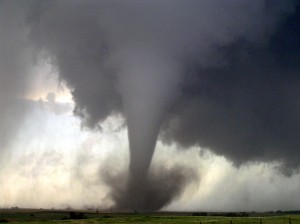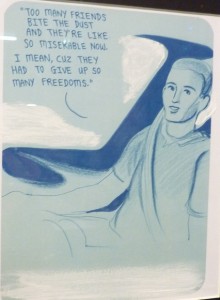
Franklin’s blog on Friday alerted me to this post by Nathan Schreiber. Schreiber’s point — about the art world being dominated by elites while the book world isn’t (as much) — ties into the conversation Franklin and I were having on Thursday.
But what really struck me about Schreiber’s post is that it was just really nice to hear someone in comics say something really positive and affectionate about fiction, because it just doesn’t happen all that often. Franklin quotes a Facebook post from Schreiber:
My post was really an expression of frustration with comics trying to climb further into the art world. Because I think comics are “stories” and while stories can be art, I think they’re stories first and art second. The art world is full of ambiguities, dominated by concepts over content, and is controlled by elites where the world of stories, well, it just makes more sense. There’s more or less universal recognition of what a good character is, a tight plot, hell, even mood.
Although he’s not necessarily talking about literary fiction (and I haven’t seen this Dash Shaw to know whether I agree with his evaluation), this comment vaguely acknowledges something extremely important that comics (and probably fine art too) should listen to: great fiction writers retain their craft even as they layer in more and more conceptual complexity. Nabokov, Pynchon, Delany, Woolf, Swift, Chaucer — there’s no shortage of concept, but there’s also plenty of craft. The craft enables the concept: the more solid the prose is, the more concept can be layered in. And sometimes the concept also illuminates the craft.
There are worthwhile exceptions, usually experimental ones — nobody’s ever going to claim that Burrough’s The Soft Machine is even a remotely good example of the writerly craft, but it’s an overt experiment, a conscious effort to figure out how to do something new and challenging. But he — and writers like Pynchon who followed him — made a successful effort afterwards to reintegrate craft with the formal and conceptual lessons learned from the experiment.
(It’s possible the caption under this Dash Shaw image in the Schreiber post is sarcastic, but it also doesn’t seem that far-fetched to claim an interest in concept for Shaw.)
There are some really brilliant avant-garde cartoonists who are on really exiting trajectories toward merging experiment and craft, like Jason Overby and Warren Craghead, and I’d like to see more cartoonists follow their lead and incorporate their insights and build on them to make new insights and eventually get to the point that cartoonists are making graphic fiction that’s as strong conceptually as literary fiction.
To do that, though, people have to get past this knee-jerk notion that craft and concept are an either/or choice. A lot of indie/alt cartooning has turned punk and underground ways of seeing the world into a fetish for harsh, angry expression and just plain ugliness, as though ugliness itself is sufficient to make a work edgy — as if ugliness is somehow inherently more meaningful than beauty. Like scatology and mundaneity, ugliness in indie comics is often a shortcut, a way of giving the illusion that something significant is going on when it really isn’t. Comics critics have mostly embraced this extremely facile way of thinking about concept as mere symbolism. In the alt comics subculture at least, I do think some of it comes from the mild contempt for writing that so many people seem to think is necessary in order to appreciate art. Maybe more of it comes from the fine art world as Franklin so often suggests. I’m willing to consider the assertion that in truly non-narrative work, an allusive, symbolic, suggestive use of concept can be successful, but I stick to the opinion that in narrative work, concept needs to be crafted so that it works with the narrative in interesting ways.
Ugly or otherwise, though, a lot of the work — in fine art or comics — that claims to be so “high concept” doesn’t really strike me as actually being all that high concept. It’s more “heavy concept” than “high concept.” Blunt, poorly wrought, overdetermined concepts weigh art down; elegant ones elevate it. I don’t think there’s a forced choice between beauty and concept; there is an aesthetic aspect to the conceptual constructs of an artwork as well (Pale Fire, which really is high-concept, is a great example, as is, say, Grünewald’s Crucifixion). But the artist just has to be willing to spend a lot more conceptual energy than most cartoonists — most artists period — are willing to do.
Postscript (added 1pm ET)
I want to be sure it’s clear that of course there’s a good bit of subjectivity involved in saying that this one thing is ugly and some other thing is not. There’s not an absolute standard. I find Ariel Schrag’s work a little aesthetically harsh, for example; Noah finds it really beautiful.
So I don’t want that pithy encapsulation up there about ugliness as a shortcut to be interpreted as a critique of any particular specific comic. It didn’t arise out of a specific reading — more an overall experience of seeing too much scatology, too much ugliness, too much mundaneity and not enough richness, not enough concen with beauty. Not from any specific cartoonist in any specific instance, but in the aggregate. The collective drive for and commitment to those aesthetics overall within indie comics often seems to be standing in the place of a drive for and commitment to more meaningful conceptual engagement.
In general, it raises the question of whether ugliness and rawness can simply be substituted for beauty and craft without any loss to the artform overall. Can you operate from a belief that ugliness is beautiful without transforming where you end up, collectively, at the end? I don’t really think you can — I think ugliness and rawness have semiotic content; I think they signify in a different way from beauty and craft. And I think their potential as such to hold a richness of meaning is more limited. But I also think — and this is the point of the post — that questions of how ugliness and beauty become meaningful, and what kinds of meaning they make, and what work is necessary to connect form and concept are discussions worth having.

